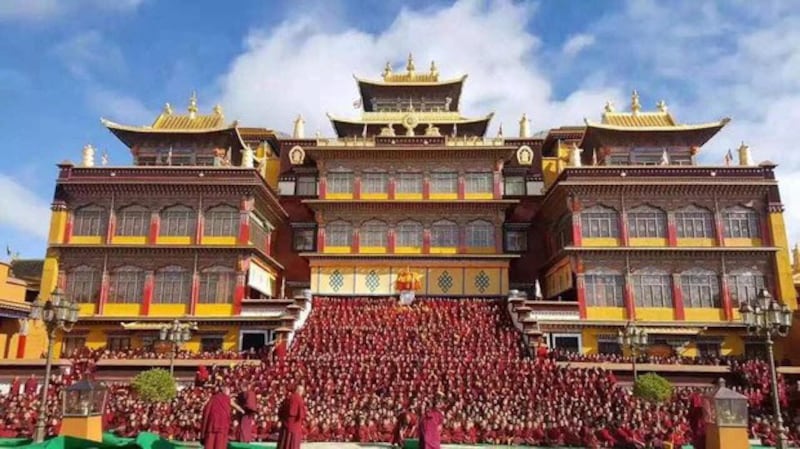Read RFA coverage of this story in Tibetan.
Hundreds of young Tibetan Buddhist monks from Kirti Monastery who were forcibly transferred in September to government-run boarding schools in Sichuan province’s Ngaba county, are being held in “prison-like conditions” in the schools, two sources from the region said.
The students, aged 6-17, are taught exclusively in Mandarin and not permitted to leave the school grounds or meet their parents, said the sources who spoke on condition of anonymity for safety reasons.
Some of the students who attempted to escape the school were apprehended and are now being treated “like criminals” and forbidden from leaving the school grounds, they said.
In July, authorities forced the closure of the monastic school of Kirti Monastery, affecting over 1,000 young Tibetan monks who were transferred to state-administered “colonial style” boarding schools.
At the time, authorities also closed the school at Lhamo Kirti Monastery in Dzoge county, affecting over 600 students.
Authorities compelled parents of the students to sign agreements ensuring that their children would be enrolled in government-run schools, where they would undergo state-approved “patriotic education.”

According to Beijing’s regulations on religious affairs, students at monastic schools must be 18 or older, display patriotism and be compliant with national laws.
Tibetan advocates see these regulations as part of broader government efforts to eradicate the use of Tibetan language, suppress Tibetan culture and enforce “patriotic education,” which mandates that love of China and of the ruling Chinese Communist Party be incorporated into work and study for all.
“Since being forcibly removed from the monastery, the students have been denied contact with their parents and receive inadequate medical care when ill,” said the first source.
“When parents request to meet their children, they are given various excuses about needing higher-level approval, and ultimately face threats of imprisonment if they persist,” he added.
Radio Free Asia has learned that in the wake of the school closures, authorities have intensified surveillance and restrictions on Tibetans in Ngaba county, with a high-ranking official from China’s United Front Work Department permanently stationed there for several months, overseeing control measures over both the monastery and the local community.
RELATED STORIES
Tibetan monks’ phones seized after accusations of sharing news about school closures
China’s controversial boarding school policy for Tibetans explained
Tibetan parents forced to enroll children at state-run residential schools
China closes 2 Tibetan monastery schools, sends novices to state boarding schools
Tibetan children taken from homes, sent to Chinese boarding schools: report
Authorities have also imposed a crackdown on any form of communication with the outside world.
In September, they arrested four Tibetans, including two monks from Kirti Monastery as well as two laypersons in Ngaba country, accusing them of contacting Tibetans outside the region.
In Dzoge county, authorities seized the phones of monks and teachers of Lhamo Kirti Monastery, accusing them of sharing the news of school closures.
The Chinese government restricts communication between Tibetans and their family members and friends abroad, saying it undermines national unity.
Tibetans have denounced Beijing’s surveillance and say authorities are violating their human rights and trying to eradicate their religious, linguistic and cultural identity.
Additional reporting by Dickey Kundol. Edited by Tenzin Pema for RFA Tibetan, and by Roseanne Gerin and Joshua Lipes.
